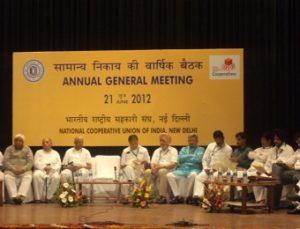Avowed objective of the Constitution (97th Amendment) Act 2011 as summarized by the Hon. Supreme Court of India: “The Parliament, with a view to enhance public faith in the co-operative institutions and to insulate them to avoidable political or bureaucratic interference brought in Constitutional (97th Amendment) Act, 2011, [Thalappalam Ser.Coop.Bank Ltd.& … vs State Of Kerala & Ors. on 7 October, 2013
Bench K.S. Radhakrishnan, A K Sikri JJ CIVIL APPEAL NO. 9017 OF 2013]
What a succinct observation: An attempt to regain, a shaken Public faith in public’s own (cooperative) movement, on account of “avoidable political or bureaucratic interference”!!!
One glaring example is the ‘BYE LAWS’ i.e. the GEETA of every cooperative society. In this we talk of the Bye Laws of cooperative housing society in Maharashtra as an illustration.
What the Hon. Supreme Court of India has said about Bye Laws:
1. Zoroastrian Co-Operative Housing Society Limited And Another V. District Registrar Co-Operative Societies (Urban) & Ors [2005]RD-SC 253 (15 April 2005): “The bye-laws of a cooperative society setting out the terms of membership to it, is a contract entered into by a person when he seeks to become a member of that society. Even the formation of the society is based on a contract”
2. Co-Operative Central Bank Ltd. & … vs Additional Industrial Tribunal, … on 3 April, 1969 [1970 AIR 245, 1970 SCR (1) 206];
“It has no doubt been held that, if a statute gives power to a Government or other authority to make rules, the rules so framed have the force of statute and are to be deemed to be incorporated as a part of the statute.”
3. State Of Maharashtra AndOrs. vsKarvanagarSahakariGriha … on 3 May, 2000 [JT 2000 (8) SC 68]:
“In our view, what is in the interest of the society is primarily for the society alone to decide and it is not for an outside agency to say. Where, however, the Government or the Registrar exercises statutory power of issuing directions to amend the bye-laws, such directions should satisfy the requirement of the interest of the Society.
4. The Bye Laws are suggested by the Commissioner and Registrar of Cooperative Societies as Model Bye Laws (1984, 2001, 2009 and 2013Draft] with no compulsion to adopt them replacing the registered Bye Laws. It is for the members of the housing society to propose new set of Bye Laws or file amendments passed in the general body meeting in compliance with the amendment procedure laid down in the Act, Rules and registered Bye Laws. As long as “No provision of the Bye Laws is repugnant to the policy directives, if any, issued by the State Government under section 4.” The Registering Authority is under statutory obligation to register the same.
THE PARADOX:
1. The entire set of Bye Laws can be adopted or amended in part by the members by passing a 2/3 majority resolution and registering with the Registering Authority. In this process, the members have to be necessarily provided with the copies of the Bye Laws; old and new or amended so that they can give their node after understanding true implications of adoption or amendment.
2. Members have a right to have a copy of Bye Laws at Costs (Bye Law No 171). The Committee members are accountable to membership and compliance of the Bye Laws is one important accountability criterion.
i. Why the Model Bye Laws (drafted by Government Machinery) should require the members to bear costs of the copy of Bye Laws?
ii. Does it not work as a deterrent for members to go for exercising their paid rights?
iii. If members in the general body meeting pass an amendment to provide a copy free of costs, should the authorities reject such amendment, as it is contrary to the Bye Law?
iv. Does the Model the Bye Laws serve as Policy directives of the State as referred to in Section 4?
v. The Bye Laws are passed by members and why they have no free access thereto?
3. There are 5 forms prescribed under Appendices 2, 2A, 11, 15 and 22 in Model Bye Laws which include following declaration by the applicant namely “I have gone through the proposed*registered Bye-laws of the Society and undertake to abide by the same and any modifications the Registering Authority may make in them. One wonders in a situation where Committee members are grossly ignorant, what purpose it serves when such declarations are signed by persons without having had a look at the Bye Laws?
Should the members of housing societies be not encouraged to draft their own Bye Laws based on Model Bye Laws ensuring that none of the Bye Law violates the M C S Act 1960, the M.C.S. Rules 1961 and Policy Directives. Should the Commissioner and Registrar of Cooperative Societies not post them on the website? In response to an RTI application the Registering Authority of the Ward “R South” in Mumbai chose to keep quiet.
Is the State Administration moving in tandem with the Policies of the Parliament as enshrined in the Constitution of India? Is the State Bureaucracy not liable to taken to tasks? Are they waiting for the Judicial overreach in telling them to perform as expected of them?
